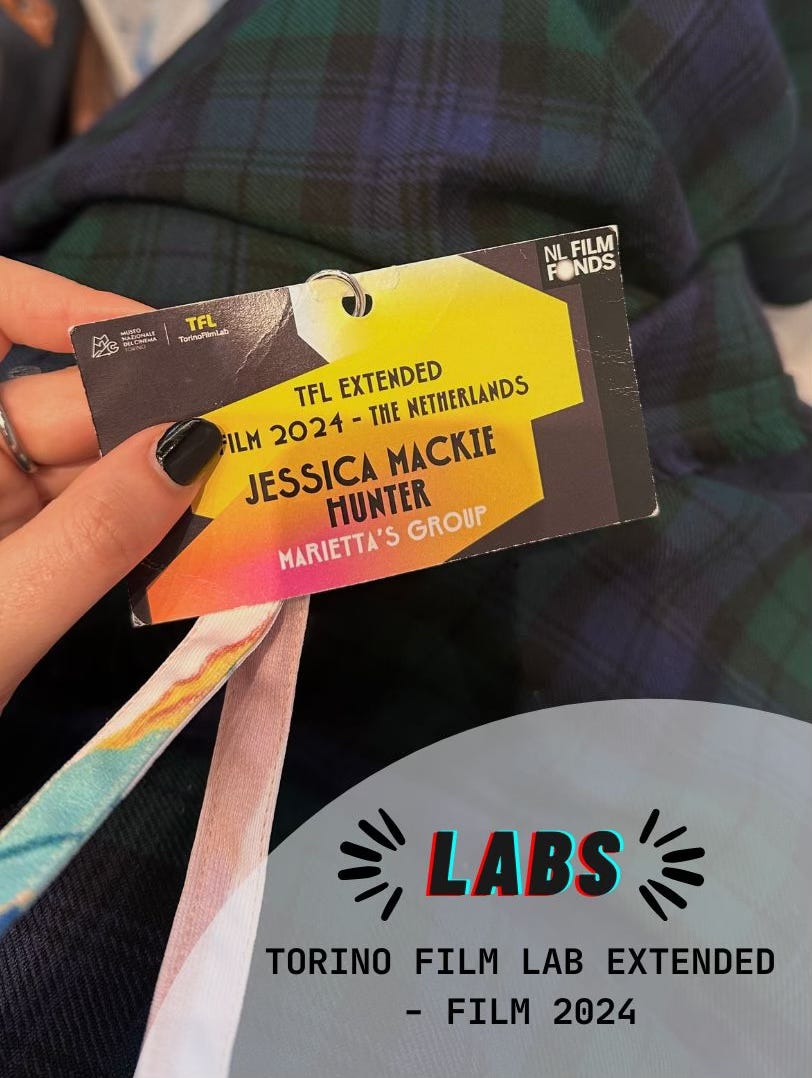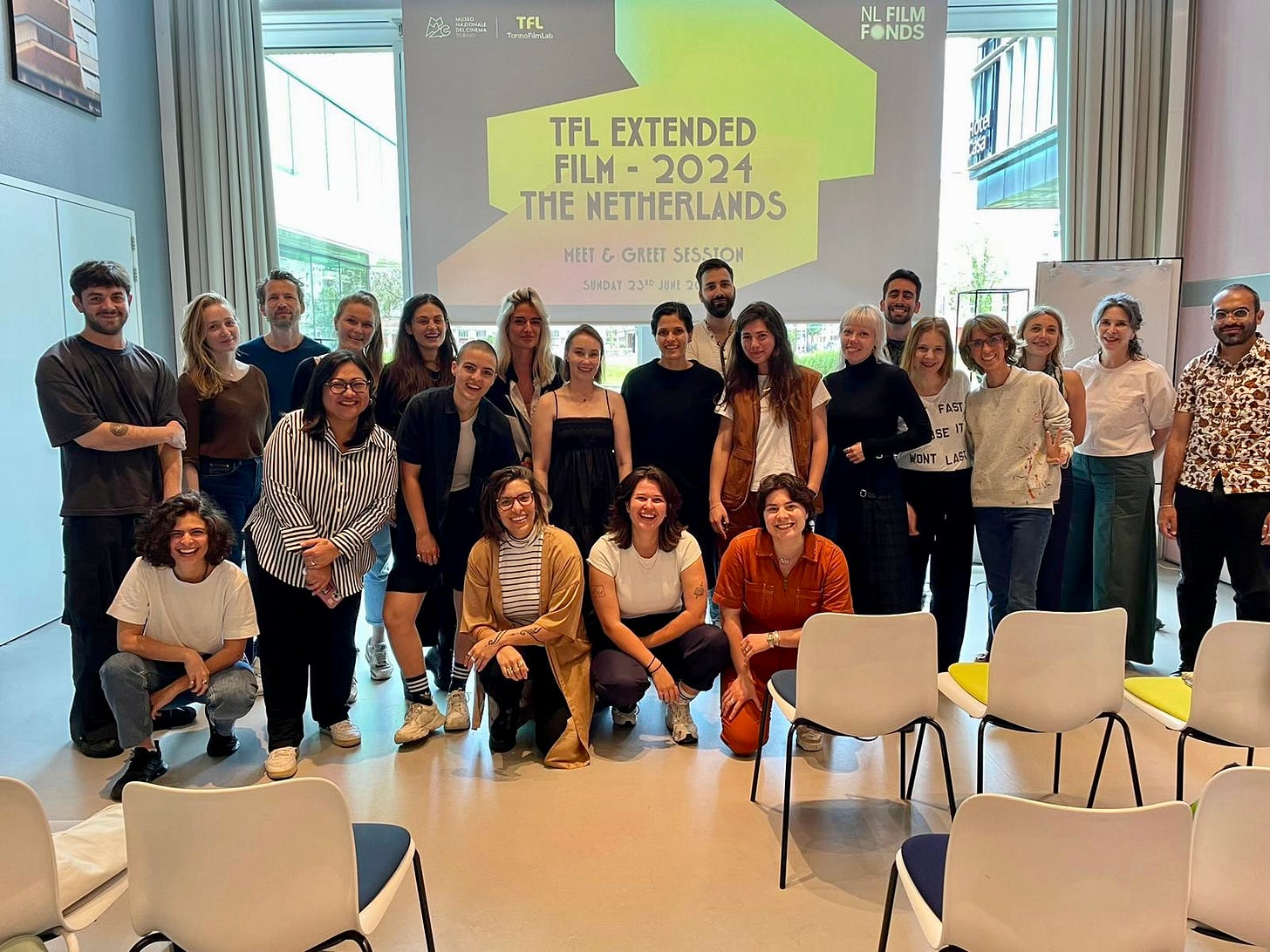In development at... Torino Film Lab 🧪
Find out everything you wanted to know about development labs!
Hello hello! We are launching a new format on LABS - or schemes, programmes, residencies!
Applying to labs takes a lot of time, energy, and oftentimes money + there are many out there that are simply a money-grabbing scheme. So we’re launching this series for writers and filmmakers to give you the lowdown based on real experiences so that you can make an informed decision when applying!
Get in touch to let us know if you’ve been to a lab (or been on a development programme or anything similar) and would like to share your experience with other potential applicants, or if you’re very much on the applicant side and have some questions you think are missing from this format!
I (Jess MH, hi) just came back from the Torino Film Lab in Amsterdam so I thought I’d kick things off by telling you a bit more about who TFL is for, what to expect, if you should apply and what I got out of it.
Tell us a little bit about the lab
Torino Film Lab is based in Turin (Italy) and it supports the development of feature films and TV series by international talent through trainings, labs and funds. The TFL run several labs, often at the same time, including the TFL FeatureLab, TFL SeriesLab, TFL ComedyLab and also several TFL Extended and TFL Next labs, which is the one I attended.
How was the application process?
The TFL Extended - Film 2024 | The Netherlands is specifically for feature films in early development stages and offers group sessions, one-to-one sessions with a high profile tutor over a four-day period in Amsterdam and one online follow-up session two months after the in-person lab.
The participation fee was quite high, €2,000 + you need to sort out your own accommodation and travel, so altogether this gig cost me around £2,380. I applied for the British Arts Council, which can cover it all if the lab is listed in their eligibility Key List. Unfortunately for me, they only fund the TFL FeatureFilm lab, and no other labs run by Torino at this time, so my first advice is to apply for the FeatureFilm lab if you’re depending on external funds.
To apply, I was asked to submit all the standard docs such as a film logline, synopsis, treatment, director’s/scriptwriter’s intention note, CV, everyone’s favourite video presentation, a link to previous works, any audiovisual approach documents and a bio.
I submitted my application classically the day of the deadline and heard back about 3 weeks after that I got in!
What about the communication and preparation before the lab?
I was asked to pay the participation fees two days after the confirmation letter to secure my spot (have those wallets ready!) and I was given an opportunity to update any of my documents before attending the lab.
The project manager, Alice, was super communicative and answered all my crazy, unhinged questions about the programme. We were sorted into groups of 5, and asked to read all the application docs by everyone in our group in advance
What did you work on? How was the process?
Day 1 started with all 25 selected teams presenting their project in front of everyone at the plenary meeting, after which we were separated into our respective groups with our designated tutor. I honestly really loved my group, led by the fantastic Marietta von Hausswolff von Baumgarten, a Swedish screenwriter working for the Sundance and Biennale College labs and running The Write Retreat.
We each had quite different projects but they were all coherent in genre or theme in some way - there was an Italian dramedy, a French period drama, a Scottish thriller, a dramedy from The Netherlands, and my Scottish road film. We were given space for each team to give feedback and reflect on the initial documents before diving deeper.
For my project, Mackie, I was mostly focusing on characters and theme. I was grilled from very early on about what I’m actually trying to say with my film, what are the questions I want to try and answer and what areas am I interested in exploring.
Hot tip: Write a diary entry from the POV of all your main characters to really get under their skin.
At the start of day 2 we had one-on-one sessions with Marietta where we discussed each of my characters. I’m writing an ensemble piece with 6 protagonists, so it was super important for me to get a very clear idea who these people are and how are they different, otherwise I’ll get the ‘why don’t you merge these two characters into one’ question down the line.
Hot tip: Go through each of your characters and figure out what’s really eating at them. Make a list of things that could possibly make things better for them; then reverse it. What situations would hurt your characters the most? Show them through the narrative. Think of 2/3 points in their development and see how you can use it in your story.
On day 3 we had to do a 5-minute verbal pitch for all the other tutors who knew nothing about our projects. No presentation, no reading off of cards, just pure stress. I was very honest in my pitch, knowing that my project was at an earlier stage than many of the others, so I talked about the theme, locations, characters and backstory.
The tutors then asked me follow-up questions for about 10 minutes which also helped to not only see the areas they found interesting/confusing, but also articulate my thoughts better. I then had an opportunity to talk to Marietta about the pitch and fine tune some elements.
Hot tip: Even in an ensemble piece you’ll have primary characters and secondary characters, so think of how can the secondary’s characters struggles/victories influence the primary characters?
Day 4 was for wrapping up on all the feedback we gathered from tutors and peers. I outlined the entire first sequence of my story, wrote detailed character bios, wrote a few paragraphs on my themes, thought of a ‘ticking clock’ and saved all the references people suggested looking up to research later. I ended the day by thinking more about obstacles, antagonistic forces, escalation and pressure.
Hot tip: If ideas come that challenge the structure of your story, be open to it.
How did you feel? How was the social aspect of it?
Even though we were split into groups of five, for lunch we had assigned seats with people outside our group to network and share ideas with, which I really liked. And of course after the workshop in the evenings we usually went to get drinks/dinner together, so there were lots of opportunities to speak to people from other groups.
I obviously got on with my group the best, I love those guys, but I also had some wonderful conversations with people whose projects I knew nothing about. On the last day there was also a communal dinner where I strengthened my relationship with the tutors too.
We still have the TFL WhatsApp group and follow each other of socials and I’ll be definitely calling on some people for late night feedback haha!
I also heard that it’s much easier getting into another TFL lab if you’ve already done one!
What are the next steps?
It was different for every group, but for mine, we have about five weeks to write a new treatment (up to 10 pages) to then submit to our tutor, and then we’ll have our final, 45-minute feedback session.
I’m currently looking over all of my notes from the lab, utilising all the character and theme work I’ve done to craft a new document. Obviously, that will still not be the final stage, but I’m hoping to apply the feedback I’ll get from Marietta for a second version of the treatment before sending it to production companies.
Overall, I had a really good experience and it was super inspiring to be surrounded by people much better than me. I wish the programme was a little but longer so I would have more dedicated time for actual writing, but I still feel like all the work I’ve done over the intensive, four days, would take me months on my own.
Hope this helps some of you when deciding whether or not to apply for TFL. If you have any more specific questions feel free to DM me as well!
Big love,
Jess
P.S. There’s a lot of conversation about labs and contests in our designated WhatsApp group - so make sure you’re in there! We want to use it as a place for people to help each other with applications






